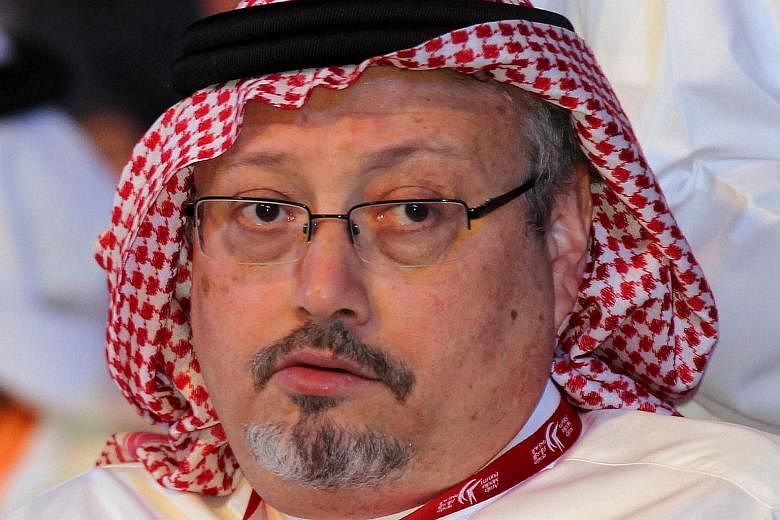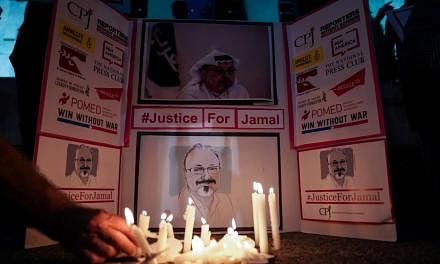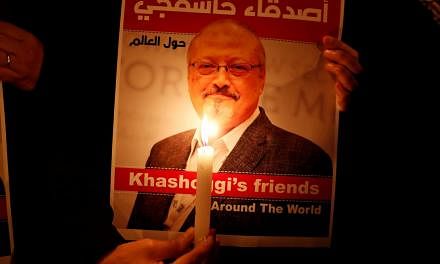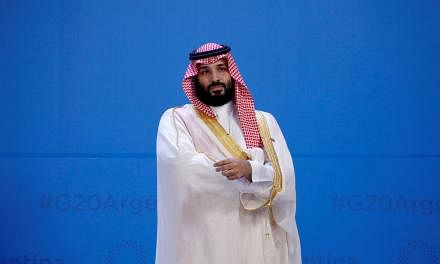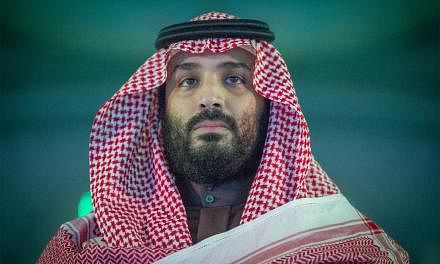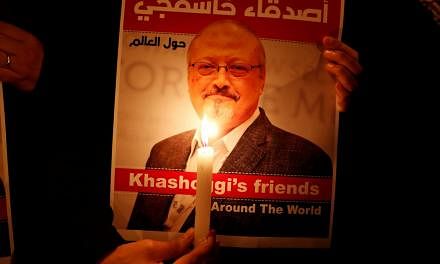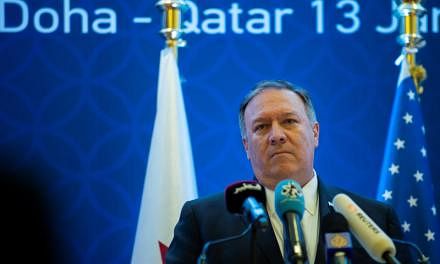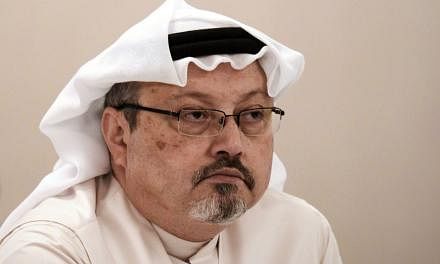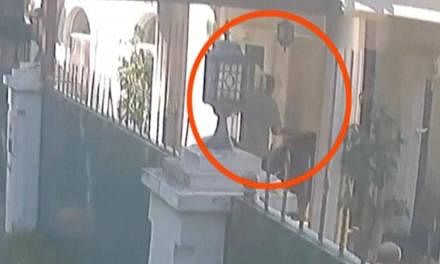RIYADH (AGENCE FRANCE-PRESSE, NYTIMES, REUTERS, WASHINGTON POST) - Saudi Arabia on Saturday (Oct 20) admitted for the first time that columnist Jamal Khashoggi, an outspoken critic of the Saudi government, was killed in its consulate in Turkey on Oct 2.
Here is a primer to get you up to speed on the investigation.
1. WHO WAS JAMAL KHASHOGGI?
Mr Khashoggi, 59, a former newspaper editor in Saudi Arabia and adviser to its former head of intelligence, left the country last year, saying he feared retribution for his growing criticism of Saudi policy in the Yemen war and its crackdown on dissent.
He had worked in the Saudi embassies in Washington and London, and some suspected he had also worked for Saudi intelligence. Then, over the years in the Saudi news media, he established himself as a kind of unofficial spokesman for the royal family, which often preferred to speak through surrogates.
His independent streak and empathy for the Western perspective made him a uniquely important, well-liked contact for foreign journalists and diplomats seeking to understand the royal perspective.
As a contributor to the Washington Post, he frequently criticised the Saudi regime's brutal tactics and was particularly critical of Crown Prince Mohammed bin Salman.
Since Mr Khashoggi disappeared, it has also become clear that he had close ties to the Muslim Brotherhood, an international Islamist movement that in recent decades has embraced elections as the best way to bring change to the region - another reason the prince might have felt hostile towards him.
2. WHY DID HE GO TO THE SAUDI CONSULATE?
Under the strain of his voluntary exile from Saudi Arabia, Mr Khashoggi's marriage had ended in a divorce, and he had since become engaged to a Turkish woman.
Mr Khashoggi needed certification from the Saudi authorities of his divorce so that he could remarry in Turkey. On Oct 2, he entered the Saudi consulate in Istanbul to get documents for his forthcoming marriage.
Security camera footage showed Mr Khashoggi entering the consulate shortly after 1pm that day. His fiancee Hatice Cengiz was waiting outside and she said that he never emerged.
The wedding was planned for the next day.
The Turkish authorities have released video footage of him walking into the consulate, but they said there was none of him walking out. Till Saturday, the Saudis had been insisting that he left the consulate safely, but had not offered any evidence.
3. WHY DID SAUDI ARABIA FINALLY ADMIT TO MR KHASHOGGI'S DEATH?
After Mr Khashoggi disappeared at the Saudi Consulate in Istanbul, the Turkish authorities did more than just quietly investigate: They narrated the crisis, focusing the world's attention on what they said was a brazen, state-sponsored assassination on its soil.
Grisly details of the alleged killing were released to the Turkish and international news media. Turkish President Recep Tayyip Erdogan publicly upbraided Saudi Arabia's leaders, accusing them of obstructing the probe.
In a final act of Turkish pressure, prosecutors said on Friday that they were interviewing Turks who worked at the consulate - employees who might have insight into the movements and actions of Saudi officials around the time Mr Khashoggi disappeared.
Turkey's Foreign Minister Mevlut Cavusoglu also warned that when Turkey completed its investigation, it would share the results "with the world".
Leaks about the case seemed to dry up about a week ago. But they started again, more lurid than before, after President Donald Trump speculated that "rogue killers" were behind Mr Khashoggi's disappearance and as Secretary of State Mike Pompeo travelled to Riyadh, the Saudi capital, and was photographed smiling next to the crown prince.
The leaks fuelled speculation that Mr Erdogan was raising the cost of his government's cooperation with Saudi Arabia, which badly wants to put the Khashoggi incident behind it.
As the Turkish authorities continued to leak more gruesome details to the press, Mr Trump took an increasingly dim view of the situation, acknowledging for the first time on Thursday that he believed Mr Khashoggi was no longer alive.
US officials had expected Saudi Arabia to take responsibility for Mr Khashoggi's death, but to explain it in a way that shielded the crown prince from responsibility.
4. WHAT DOES SAUDI ARABIA SAY HAPPENED TO MR KHASHOGGI?
Saudi Arabia claimed that Mr Khashoggi was killed after an argument and fist fight with unidentified men inside the Saudi Consulate.
Eighteen Saudi men have been arrested and are being investigated in the case, Saudi state-run media reported without identifying any of them.
State media also reported that Mr Saud al-Qahtani, a close aide to the crown prince, had been dismissed, along with Major-General Ahmed al-Assiri, the deputy director of Saudi intelligence, and other high-ranking intelligence officials.
They did not say whether the men's firing had a connection to the Khashoggi case or whether they were being investigated for playing a role in it.
A statement from the Centre for International Communication under the Saudi Ministry of Media quoted an unnamed official as saying: "The case of the disappearance of the citizen/Jamal bin Ahmed Khashoggi drew the attention of the Kingdom of Saudi Arabia at the highest levels, and due to the circumstances surrounding his disappearance, the Kingdom took the necessary procedures to clarify the truth and began by dispatching a security team to Turkey on October 6, 2018, to investigate and cooperate with counterparts in Turkey."
"In implementation to the directives of the leadership of the need to clearly know the truth and declare it transparently whatever, the preliminary investigations conducted by the Public Prosecution showed that the suspect had travelled to Istanbul to meet with the citizen Jamal Khashoggi as there were indications of the possibility of his returning back to the country," said the statement.
"The results of the preliminary investigations also revealed that the discussions that took place with the citizen/Jamal Khashoggi during his presence in the Consulate of the Kingdom in Istanbul by the suspects did not go as required and developed in a negative way, led to a fight and a quarrel between some of them and the citizen/Jamal Khashoggi, yet the brawl aggravated to lead to his death and their attempt to conceal and cover what happened," it added.
The source added that while the investigations are still ongoing into the case with the 18 Saudi detainees, the Kingdom expresses its deep regret at the "painful developments" that have taken place.
5. IS THERE ANY OTHER VERSION OF WHAT HAPPENED TO MR KHASHOGGI?
While yet to be made public, Turkey's investigation into the disappearance has revealed recordings made on Mr Khashoggi's Apple Watch purportedly indicating he was tortured and killed, Daily Sabah has reported.
"The moments when Khashoggi was interrogated, tortured and murdered were recorded in the Apple Watch's memory," the paper said, adding that the watch had synched with his iPhone, which his fiancee was carrying outside the consulate.
Two senior Turkish officials previously said that Mr Khashoggi had been wearing a black Apple watch when he entered the consulate and that it was connected to a mobile phone he left outside.
However, it was not clear whether data from Mr Khashoggi's watch could have been transmitted to his phone outside, or how investigators could have retrieved it without obtaining the watch themselves.
Sabah, which cited "reliable sources in a special intelligence department" for its report, said Mr Khashoggi was believed to have turned on the recording feature on the phone before entering the consulate.
The paper said Saudi intelligence agents had realised after he died that the phone was recording and they used his fingerprint to unlock it, deleting some files, but not all of them.
Separately, a team of Turkish police investigators and prosecutors on Tuesday scoured the Saudi consulate in Istanbul in an unprecedented eight-hour night-time search.
The Turkish team, who conducted the investigation alongside a Saudi delegation, took samples with them, including soil from the consulate garden that was loaded into vans, one official present said.
Later on Tuesday, Mr Erdogan said that some of the materials at the Saudi consulate have been painted over. He also told reporters that they were looking into toxic materials at the mission.
Separately, pro-government daily Yeni Safak reported on Wednesday (Oct 17) that it had heard audio recordings that showed Mr Khashoggi was tortured before being decapitated inside Riyadh's consulate in Istanbul.
Mr Khashoggi's alleged killers tortured the journalist during an interrogation by cutting his fingers off, Yeni Safak said, claiming it had heard multiple recordings of the incident.
The newspaper said Mr Khashoggi, a Washington Post contributor, was then decapitated.
Top security officials have concluded that Mr Khashoggi was assassinated in the Saudi consulate in Istanbul on orders from the highest levels of the royal court. The security establishment concluded that Mr Khashoggi's killing was directed from the top because only the most senior Saudi leaders could order an operation of such scale and complexity, one official said, speaking on condition of anonymity.
Meanwhile, US intelligence intercepts have also been revealed of Saudi officials discussing a plan to lure Mr Khashoggi back to Saudi Arabia from his home in Virginia and then detain him on the orders of Crown Prince Mohammed bin Salman.
6. HOW DID TURKEY LINK SAUDI ARABIA TO THE MURDER IN THE FIRST PLACE?
Daily Sabah said two private Gulfstream IV planes belonging to Sky Prime Aviation, a charter service that has often worked with the Saudi government, took off from Riyadh on Oct 2 carrying intelligence agents or government officials.
One plane landed at Istanbul's Ataturk Airport that day with nine passengers on board. They checked into two hotels near the consulate and booked rooms for three nights. But they left later that day at 10.46pm in the same jet, stopping in Dubai on the way back to Riyadh.
A second plane landed in Istanbul at 5.15pm that same day with six passengers. All went directly to the consulate and quickly returned to the airport. Their plane took off at 6.20pm, barely an hour after it had arrived, stopping in Cairo as it returned to Riyadh.
Daily Sabah reported that 2½ hours after Mr Khashoggi entered the facility, six vehicles with diplomatic licence plates pulled out, carrying 15 Saudi officials and intelligence officers.
Two other vehicles, including a black Mercedes Vito van with darkened windows, travelled from the consulate to the consul's residence 182m away.
Turkish employees of the residence had unexpectedly been told not to report for work that day and police investigators suspect Mr Khashoggi was in the van, reported Daily Sabah, without naming its sources.
A senior Turkish official has described a quick and complex operation in which Mr Khashoggi was killed within two hours of his arrival at the consulate by a team of Saudi agents, who dismembered his body with a bone saw they brought for the purpose.
"It is like Pulp Fiction," the official said, referring to the Hollywood movie.
7. WHO ARE THE SUSPECTS IN MR KHASHOGGI'S MURDER?
While the Saudi government has not named the people detained over the murder, Turkey's Sabah Daily has said one suspect, Mr Maher Abdulaziz Mutreb, was a diplomat assigned to the Saudi embassy in London in 2007, citing a British diplomatic roster.
Mr Mutreb, perhaps a bodyguard, has been photographed emerging from planes with Prince Mohammed on recent trips to Madrid and Paris, the newspaper reported.
It added that Mr Mutreb was also photographed standing guard during Prince Mohammed's visits in the United States to Houston, Boston and the United Nations.
The New York Times said three other suspects are Mr Abdulaziz Mohammed al-Hawsawi - a member of the security team that travels with Prince Mohammed - Mr Thaar Ghaleb al-Harbi, and Mr Muhammed Saad Alzahrani.
Mr Harbi and Mr Alzahrani have the same names as two people who have been identified as members of the Saudi Royal Guard, the New York Times said.
The fifth suspect is an autopsy expert, Mr Salah al-Tubaigy, who the New York Times said identified himself on his Twitter account as the head of the Saudi Scientific Council of Forensics.
He also held high positions in the Interior Ministry and the kingdom's top medical school, the report said.
